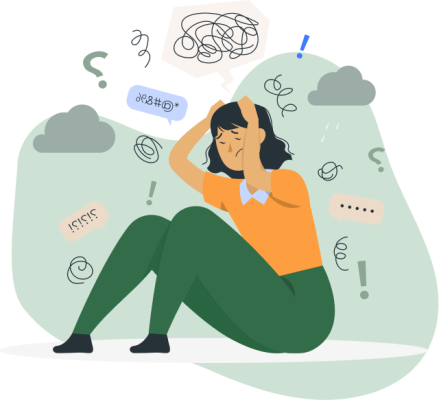Depression

Jenny was always happy and full of energy, but recently she has been feeling empty and sad. It was hard to enjoy things that she previously loved doing. She didn’t know why, but it was difficult to do anything for her. She remained lost in her thoughts. She didn’t want to talk to anyone about how she was feeling.
But eventually, she decided to talk to a therapist. The therapist helped Jenny understand that she was dealing with depression and Just like how we can get sick physically and need medicine to feel better, people with depression may need help from a therapist to feel better mentally.
“According to the World Health Organization, depression is the leading cause of disability worldwide. Globally, more than 300 million people of all ages suffer from the disorder, regardless of culture, age, gender, religion, race or economic status.”
Symptoms

- Feelings of sadness, tearfulness, emptiness or hopelessness
- Angry outbursts, irritability or frustration, even over small matters
- Loss of interest or pleasure in most or all normal activities, such as sex, hobbies or sports
- Sleep disturbances, including insomnia or sleeping too much
- Tiredness and lack of energy, so even small tasks take extra effort
- Reduced appetite and weight loss or increased cravings for food and weight gain
- Anxiety, agitation or restlessness
- Slowed thinking, speaking or body movements
- Feelings of worthlessness or guilt, fixating on past failures or self-blame
- Trouble thinking, concentrating, making decisions and remembering things
- Frequent or recurrent thoughts of death, suicidal thoughts, suicide attempts or suicide
- Unexplained physical problems, such as back pain or headaches
Depression symptoms in children and teens

In younger children, symptoms of depression may include sadness, irritability, clinginess, worry, aches and pains, refusing to go to school, or being underweight.

In teens, symptoms may include sadness, irritability, feeling negative and worthless, anger, poor performance or poor attendance at school, feeling misunderstood and extremely sensitive, using recreational drugs or alcohol, eating or sleeping too much, self-harm, loss of interest in normal activities, and avoidance of social interaction.
Depression symptoms in older adults
Depression is not a normal part of growing older, and it should never be taken lightly. Unfortunately, depression often goes undiagnosed and untreated in older adults, and they may feel reluctant(not wanting to do something because you are not sure it is the right thing to do) to seek help. Symptoms of depression may be different or less obvious in older adults, such as:
- Memory difficulties or personality changes
- Physical aches or pain
- Fatigue, loss of appetite, sleep problems or loss of interest in sex — not caused by a medical condition or medication
- Often wanting to stay at home, rather than going out to socialise or doing new things
- Suicidal thinking or feelings, especially in older men

Types of Depression

Clinical depression (major depressive disorder)
A diagnosis of major depressive disorder means you’ve felt sad, low or worthless most days for at least two weeks while also having other symptoms such as sleep problems, loss of interest in activities or change in appetite. This is the most severe form of depression and one of the most common forms.

Melancholy
Melancholy is a state of mind characterized by feelings of sadness, loneliness, and a sense of emotional discomfort or unease. You feel intensely sad and lose interest in the activities you used to enjoy. You feel bad even when good things happen.

Agitated
Agitated is a term used to describe a state of extreme emotional and physical disturbance or restlessness. It is characterized by a sense of nervousness, anxiety, and agitation, and can manifest in various ways, such as pacing, fidgeting, or rapid speech. You feel uneasy most of the time.

Persistent Depressive Disorder
Persistent Depressive Disorder (PDD), also known as dysthymia, is a mood disorder characterized by persistent and long-lasting symptoms of depression. It is a chronic condition that lasts for at least two years in adults or one year in children.

Bipolar Disorder
Bipolar disorder, also known as manic-depressive illness, is a mental health condition that is characterized by cycles of mood swings that range from extreme highs (mania or hypomania) to extreme lows (depression).

Peripartum (Postpartum) Depression
Women who have major depression in the weeks and months after childbirth. It is reported to occur in 15% of women shortly before or any time after childbirth Approximately 1 in 10 men also experience depression in the peripartum period.

Premenstrual Dysphoric Disorder (PMDD)
Premenstrual Dysphoric Disorder (PMDD) is a type of premenstrual syndrome that affects some women during the luteal phase of their menstrual cycle (the 7-14 days before the onset of menstruation). It is a severe and disabling form of PMS that can significantly impact a woman’s quality of life.

Situational Depression
Situational depression, also known as adjustment disorder with depressed mood, is a type of depression that is triggered by a stressful or difficult life event or situation, such as the loss of a loved one, a relationship breakup, financial problems, or a job loss.
Causes

Complications
Depression is a serious disorder that can take a terrible toll on you and your family. Depression often gets worse if it isn’t treated, resulting in emotional, behavioural and health problems that affect every area of your life. Examples of complications associated with depression include:

Excess weight or Obesity

Pain or Physical illness

Alcohol or Drug misuse

Family Conflicts or Relationship
difficulties

Social Isolation

Suicidal Feelings

Anxiety, Panic Disorder or
Social Phobia

Self-Mutilation

Premature Death

DO NOT USE THIS SITE IF YOU ARE IN A LIFE-THREATENING SITUATION.
Use government helpline to get immediate assistance.
Copyright © 2023 The Peace Lab
Powered by The Peace Lab

Powered by The Peace Lab
Copyright © 2023 The Peace Lab